The Health Insurance Portability and Accountability Act (HIPAA) sets strict standards for protecting sensitive patient health information (PHI). Ensuring HIPAA compliance for healthcare applications is not only a regulatory requirement. But it is also an important factor in protecting patient data from breach or misuse. HIPAA compliance-focused testing of healthcare applications is an important step in ensuring data security, privacy and completeness in operations
In this blog, we explore important considerations to ensure HIPAA compliance during testing of healthcare applications.

Complete Guide for Complying with HIPAA Regulations
This eBook is a comprehensive guide to mastering HIPAA compliance, covering key regulations, actionable steps, and checklists to ensure patient data protection and regulatory adherence.
1️⃣ Understand HIPAA Compliance in Healthcare Applications
Before delving into testing strategies it is important to understand how HIPAA compliance relates to healthcare use.
- HIPAA has specific rules that healthcare providers, insurance companies, and other entities that handle PHI must follow.
- The Privacy Act governs the use and disclosure of PHI. Security rules set standards for protecting electronic PHI (ePHI).
- Breach notification rules require patients to be notified in the event of a data breach. Compliance certification requires your application to comply with these regulations.
We take appropriate precautions to protect PHI at every step, from collection to transit.
2️⃣ Safety Risk Assessment (SRA) in Trials
Conducting a security risk assessment (SRA) is an important step in ensuring that all potential risks to PHI are identified and mitigated. This evaluation must be included in the testing strategy.
The SRA assesses that: Data vulnerabilities, such as weak encryption or insecure communication channels.
Potential threats such as cyberattacks Unauthorized access and unintentional violations Evaluate use for these risks during testing and ensure that measures are in place to secure sensitive health data at every touchpoint.
3️⃣ Access Control Testing
HIPAA imposes strict controls on who has access to PHI. Testing of access controls focuses on ensuring that only authorized users, such as health care providers, Only patients can view or edit patient information. Important tests include:
- Role-based access control (RBAC): Ensures that users can only access PHI according to their assigned roles within the organization.
- Authentication Mechanism: Verify the login protocol. Multi-factor authentication (MFA) and session timeout features
- Audit Trail: Verify that the system keeps detailed records of who accessed or modified PHI and when these actions occurred. Access control testing helps ensure that sensitive patient information cannot be accessed by unauthorized parties or exploited by internal vulnerabilities.
Related Read: Healthcare Mobile Apps: Best Practices for Testing and Compliance
4️⃣ Data Encryption Test
HIPAA requires healthcare applications to encrypt PHI at rest (when stored) and in transit. (When sent between systems) Encryption plays an important role in protecting sensitive data from breaches.
During testing Pay attention to the following points:
- Encryption Protocol : Verify that a strong encryption method is used, such as AES-256 or RSA.
- Data in transit: Test the security of data sent over the network by simulating man-in-the-middle attacks or other interception methods.
- Data at rest: Ensure PHI is stored securely by testing encryption at the database and file storage level.
Encryption verification ensures that patient data remains unreadable by unauthorized parties. Even if it is intercepted or stolen.
5️⃣ Testing for Data Integrity
Data integrity is crucial for maintaining the accuracy and reliability of PHI. Errors in data storage or transmission can have serious consequences for patient care and privacy. HIPAA mandates that healthcare applications ensure data integrity through proper testing mechanisms.
Tests should include:
- Data validation: Verify that data entered into the system is accurate, complete, and free from corruption.
- Hashing mechanisms: Ensure the application uses secure hashing algorithms to detect any unauthorized changes to data.
- Error handling: Test the system’s ability to handle errors such as network interruptions or system crashes without compromising data integrity.
Properly testing for data integrity helps prevent unintended data corruption or loss, ensuring the quality and security of PHI.
Watch more insights in our latest video—watch now!
What Is This Video About?
🌟The 7 fundamental elements of an effective compliance program
🌟How can you keep your data and business safe in a remote work environment?
🌟How to simplify your HIPAA Compliance Program?
🌟How to protect your business from breaches and fines?
🌟And many more tips and tricks!
6️⃣ Testing of Secure Data Communication
Secure data transmission is another important aspect of HIPAA compliance. Healthcare applications must protect PHI when it is transferred between users, systems, or devices.
To ensure safe transmission:
- Communication channel test: Verify that data transmission between the client and server is encrypted using the SSL/TLS protocol.
- Attack simulation: Test your system's resilience against network attacks, such as packet sniffing or session hijacking.
- Ensure API security: Ensure that any APIs used to transfer PHI are properly protected with authentication and encryption.
Ensuring secure data transmission helps prevent unauthorized access to PHI as it travels across networks. Therefore ensuring privacy
7️⃣ User Authentication and Session Management
Healthcare applications require strong user authentication mechanisms and robust session management to remain HIPAA compliant. Authentication checks ensure that users are authenticated. Properly verify before accessing PHI.
The test includes:
- MFA testing: Ensure that multi-factor authentication is used correctly and works as intended.
- Session management: Ensure that inactive sessions are automatically terminated after a preset period of time to prevent unauthorized access.
- Password policy: Ensure password strength requirements and periodic changes meet HIPAA guidelines.
Proper testing of authentication mechanisms prevents unauthorized access to PHI. It ensures that only legitimate users can log in and access data.
8️⃣ Checking Infringement Notices
HIPAA Breach Notification Rules require healthcare organizations to notify patients and covered entities in the event of a data breach. Testing of breach detection and information systems helps ensure compliance with this requirement.
Violation testing includes:
- Simulate a breach scenario: Test how your application responds to a potential breach, such as database access or system hacking.
- Automated breach notifications: Ensure that the system triggers alerts and logs events when PHI is compromised.
- Notification Process: Review the notification process for patients and regulatory agencies. This ensures that the timeline and content meet HIPAA breach notification standards.
Breach detection testing and data ensures that healthcare organizations can respond quickly and effectively in the event of a security breach.
9️⃣ Third-Party Vendors and Integration Testing
Many healthcare applications rely on third-party vendors for a variety of services, such as cloud storage. payment processing or API integrations. Testing these integrations is important for HIPAA compliance because third-party vendors may also have access to PHI.
The test should cover the following:
- Vendor Compliance: Ensure third-party vendors are HIPAA compliant by conducting regular audits and security reviews.
- Secure Integration: Test third-party APIs and services to verify they handle PHI securely.
- Business Associate Agreement (BAA): Ensure that the organization has signed a BAA with each third-party vendor that handles PHI as required by HIPAA.
Third-party testing ensures that PHI remains secure even if transferred or processed by an outside vendor.
Related Read: The Secret Weapon of HIPAA Compliance: Business Associate Agreements
Gathering together
Ensuring HIPAA compliance in healthcare application testing requires a thorough understanding of the regulations and comprehensive testing strategies. From secure data transmission and encryption to access control and breach notification. Every aspect of the system should be tested to protect PHI and prevent potential breaches. By integrating these important considerations into your healthcare application testing process. You can rest assured that your system remains HIPAA compliant while providing a secure and reliable platform for managing sensitive patient data.

Nikeeta Soni, Senior QA Engineer
Senior QA Engineer with over 4+ years of professional experience in testing web and mobile applications. My expertise includes functional, regression, and smoke testing, with hands-on experience in API and performance testing. I specialize in ensuring high-quality deliverables particularly in the healthcare domain.
Frequently Asked Questions
- What is HIPAA compliance in healthcare applications?
HIPAA compliance ensures that healthcare applications protect sensitive patient health information (PHI) in accordance with legal regulations.
- Why is testing essential for HIPAA compliance?
Testing helps identify vulnerabilities in healthcare applications, ensuring data security, privacy, and adherence to HIPAA standards.
- What are the key components of HIPAA compliance testing?
Key components include data encryption, access control, data integrity testing, secure data communication, and breach notification systems.
- What types of encryption are recommended for securing PHI?
Healthcare apps should use robust encryption algorithms like AES-256 for data at rest and secure transmission protocols like SSL/TLS for data in transit to ensure PHI remains secure.
Let's Get In Touch
One thing that really stood out to me is the culture and values of the Mindbowser team.

Sanji Silva
Chief Product Officer, Mocingbird
I am so glad I worked with Mindbowser to develop such an Impactful Mobile app.

Katie Taylor
Founder and CEO, Child Life On Call
Mindbowser was an excellent partner in developing my fitness app.

Jirina Harastova
Founder, Phalanx Ubiquity
The team understood the challenges faced by both CME administrators and clinicians and translated that understanding into building the platform. We're totally impressed by their deep domain and technology expertise in creating a solution that empowers both administrators and medical professionals.

Ian Modam
CEO & Co-Founder, Mocingbird
Mindbowser team’s expertise and dedication has been instrumental in improving our platform’s efficiency. We have observed a reduction in average delivery time since the integration. Kudos to the wonderful team!!!!

Anish J. Shah
Founder, BirthModel
Mindbowser built both iOS and Android apps for Mindworks, that have stood the test of time. 5 years later they still function quite beautifully. Their team always met their objectives and I'm very happy with the end result. Thank you!

Bart Mendel
Founder, Mindworks
Some of the features conceived, implemented, and designed by the Mindbowser staff are amongst our most popular features.

Matthew Amsden
CEO, Proofpilot
Mindbowser is one of the reasons that our app is successful. These guys have been a great team.

Dave Dubier
Founder & CEO, MangoMirror
The Mindbowser team's professionalism consistently impressed me. Their commitment to quality shone through in every aspect of the project. They truly went the extra mile, ensuring they understood our needs perfectly and were always willing to invest the time to deliver exactly what we envisioned.

Spencer Barns
Chief Technology Officer, New Day Therapeutics
Kudos for all your hard work and diligence on the Telehealth platform project. You made it possible.

Joyce Nwatuobi
CEO, ThriveHealth






